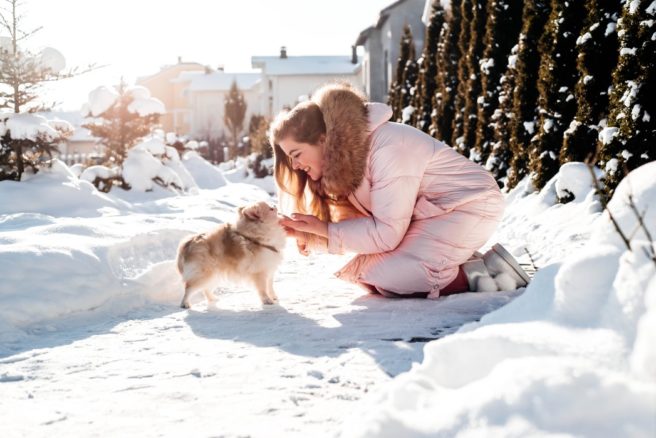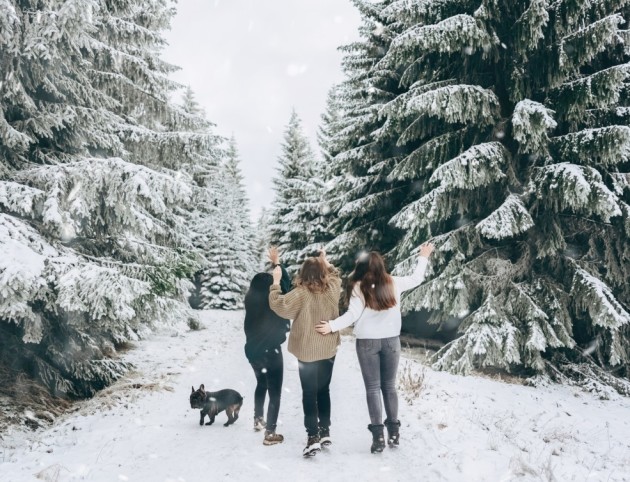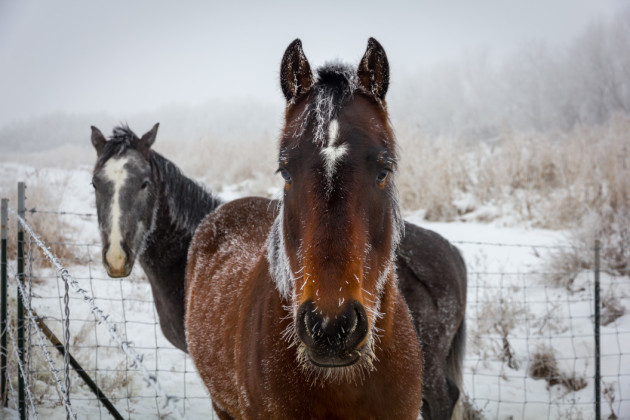
Petcare tips and advice during frost and snow
With the arrival of frost and snow in many areas across Ireland this week, we put together some tips and advice to help avoid any hazards and to keep your pets safe during the cold spell.
Heading out for a walk?
If the temperature outside is too cold for you to stay outdoors, the same may be true for your pets. Certain dog breeds are well-adapted for cold weather, but others such as small dogs, sighthounds, short-haired dogs, older dogs or those with health problems may have less tolerance for freezing temperatures. If you are unsure how well your pet will adapt in colder weather, speak to your vet for advice.
The ISPCA recommends opting for shorter, more frequent walks especially on these cold days keeping pets on a lead and away from frozen lakes or ponds to prevent them from falling through the ice. This type of weather also inhibits a dog’s sense of smell that they use to navigate, and they can get disoriented so it’s also important to ensure your dog is microchipped and also wearing an ID tag so they can be quickly reunited if they get lost. If your dog is comfortable wearing a jacket or jumper, have a dry one on-hand. A wet jumper will make your pet colder, so check it regularly.
Be careful of the surface where your dog walks, and try to keep him or her away from roads that are covered in salt. When your dog comes inside, fully wipe down their paws, legs and belly to remove salt and de-icing chemicals that may have been on the road. These can cause irritation or stomach upset if licked off your pet’s feet or fur. The same goes for cats when you bring them inside during the winter.
If you are walking your pet at night, wear a high-vis or bright colours so you can both be seen. Bring along a torch, because even in the dark you have to clean up after your dog.
After your walk
When you come in from a walk, check your dog's paw pads and between the toes for cracked skin, bleeding, or salt. Chloride salts heat up substantially when mixed with water, a chemical reaction that can be extremely painful if the salt is lodged between your pet’s toes.

Try not to shave your dog’s fur during the winter.
If your dog coat needs regular grooming, simply trim to minimise the amount of snow, ice or salt crystals that get caught in his or her fur. Additionally, be careful not to give too many baths in winter, as they can lead to dry, flaky skin.
Many ice melting products are toxic to pets.
When looking for de-icing products to use at home, look for pet-friendly ones. Check the ingredients—those with propylene glycol are safer than most.
Anti-freeze is extremely toxic to pets if ingested, but it tastes good to them. All containers should be secured and stored well away from curious paws and noses. Any spills should be cleaned up immediately. If you suspect your pet has ingested anti-freeze, contact your vet immediately. Learn more about the signs of anti-freeze poising here.
Ensure pets have access to unfrozen water, extra food, and good shelter
Don’t leave them outside for long periods on freezing cold or wet days, ensure they have warm shelter away from the harsh wind or rain. Give them a little extra food and ensure there is clean (unfrozen) drinking water available. The ISPCA recommends bringing outdoor pets inside on cold days, especially overnight, or alternatively having a dry, outdoor shelter for them. This should be raised from the ground with the entrance blocked from rain, snow or wind. The shelter should be dry, with thick bedding that is changed regularly. Additionally, feral or outdoor cats looking for somewhere warm to sleep may curl up beneath the bonnet of a car. Always bang on your car bonnet or honk the horn before driving off to give sleeping kitties the chance to run away.
Some hazards are indoors
Heaters and fireplaces indoors can be as much of a hazard as the cold. Make sure pets stay a safe distance away from open fires and heaters so they can’t burn themselves. Ensure pets have a warm place to sleep, and keep pets such as birds and small mammals away from vents and drafts.

Caring for Equines
All horses, ponies and donkeys need a purpose-built shelter or cosy stable this time of year. For some equines, there won’t be enough shelter in fields to keep them warm, and they will need to wear a rug to protect them from the elements. Ensure the rug fits them correctly and is not damaged. Check daily for rub marks or injuries that might be obscured by the rug.
Equines may be susceptible to a number of ailments such as rain scald or mud rash so it is important they have good shelter and hard ground to stand on.
Caring for other animals
Small mammals such as rabbits and guinea pigs require special attention during cold winter months, especially if they are kept outside. Outdoor hutches or shelters should be covered to ensure they are waterproof and there are no drafts. You should add extra bedding and change it more frequently, and also check water bottle routinely to make sure it hasn’t frozen and there is a fresh supply always available.
It’s always best to move your pet’s shelter indoors into a shed or garage, but not in an area where cars are stored overnight as the fumes can be seriously damaging.
Don’t forget to feed our wildlife such as garden birds struggling to find suitable food by using handing feeders or bird tables such as seeds and grains like nyjer, millet, oats and sunflower seeds.






